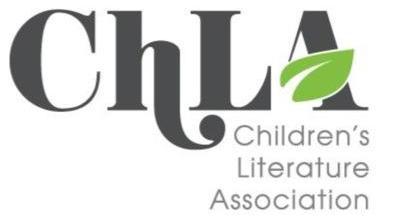- About ChLA
- Committees
- Accessibility Committee
- Anne Devereaux Jordan Committee
- Article Award Committee
- Astrid Lindgren Award Committee
- Book Award Committee
- Communications Committee
- Conference Advisory Committee
- Diversity Committee
- Edited Book Award Committee
- Ethics Committee
- Grants Committee
- Global Committee
- Judith Plotz Emerging Scholar Award Committee
- Membership Committee
- Ombuds Committee
- Phoenix Award Committee
- Phoenix Picture Book Award Committee
- Members
- Events
- Awards & Grants
- Publications
- Opportunities & Resources
Teaching & LearningRecently, the ChLA Executive Board recommended that a section of the new web site be committed to Teaching and Learning, and began to form a committee for that express purpose. "Teaching and Learning" will encompass the major categories of professional life not directly touching on scholarship or publication, which might include: Why study children’s literature (conceptual) In the last few years, the annual conference has featured sessions at which questions have arisen regarding how the profession of teaching children’s literature ought to continue, particularly with respect to whether the field should be re-conceptualized as a multi-disciplinary study of childhood or remain steadfastly focused on literature. We expect that members who have thought further about these professional and teaching-related issues, as well as about educational methods and practices, and educational projects and the difficulty and rewards of teaching children's literature, will serve on or work with the committee to recommend and provide content. In the long run, the ChLA may develop the equivalent of a “teaching division and committee” to formalize methods for thinking about and discussing pedagogical questions, for which the members of this committee will be precursors. For now, we strongly believe that "Teaching and Learning" should include some of the following: an education mission statement; criteria of teaching excellence; resources for students; tips on preparing for the job market; tips on graduate school (something like a Grad School Michelin Guide - “Graduate School for Start to Finish”); a discussion of how teaching and learning has been influenced or possibly reshaped by the digital age; benchmarks; something like an overview of professional development within the field of teaching children’s literature and; since teaching and learning overlaps areas of long interest to the ChLA; essays on multicultural and international topics; such as “Creating and Preserving Cultural Heritage in the Arab World,” or “Teaching Children’s Literature in The Third World,” or “Teaching Children’s Literature in Urban America.” Despite photographs of the annual conference and smiling children, the old website presented somewhat of a stiff, impersonal, elusive image, which we believe "Teaching and Learning" can help to rectify by presenting ideas that are closer to the reality of ChLA. We very much hope to make this section of the website more personal and to give ChLA members opportunities to showcase their own teaching experiences and projects, and to publish essays and addresses that engage with educative topics. For example, under the rubric, “Why study children’s literature,” we will post brief, subjective essays by self-selected members, which we will rotate on and off the site, and feature member testimonials about teaching careers. As well as informing the membership, these essays and videotapes will model the profession for other academics, potential students, and the general public. These are but a few of our ideas (some boldly plagiarized by studying the website of other similar organizations). We look forward to building them onto the new website over the next several months and years. Some components will be more difficult and involve creating new material, but some should be easy. In the category of "Current Projects", for example, we hope to foreground teaching projects being undertaken by members as well as teaching projects sponsored by ChLA. In this way, we will not only provide a frame for new initiatives, but also draw attention to our important, ongoing commitments-our awards to student essayists, and our grants programs, for example-by which we encourage learning. We believe “Teaching and Learning” will make a fabulous, substantive contribution to the quality and utility of the ChLA website, to ChLA, and to the public understanding of who we are. We are enthusiastically looking forward to drawing on the expertise of old and new members to develop content as well as a process for thinking about "Teaching and Learning" issues-issues that are among the most integral to the learned profession of the academic study of children’s literature. |
